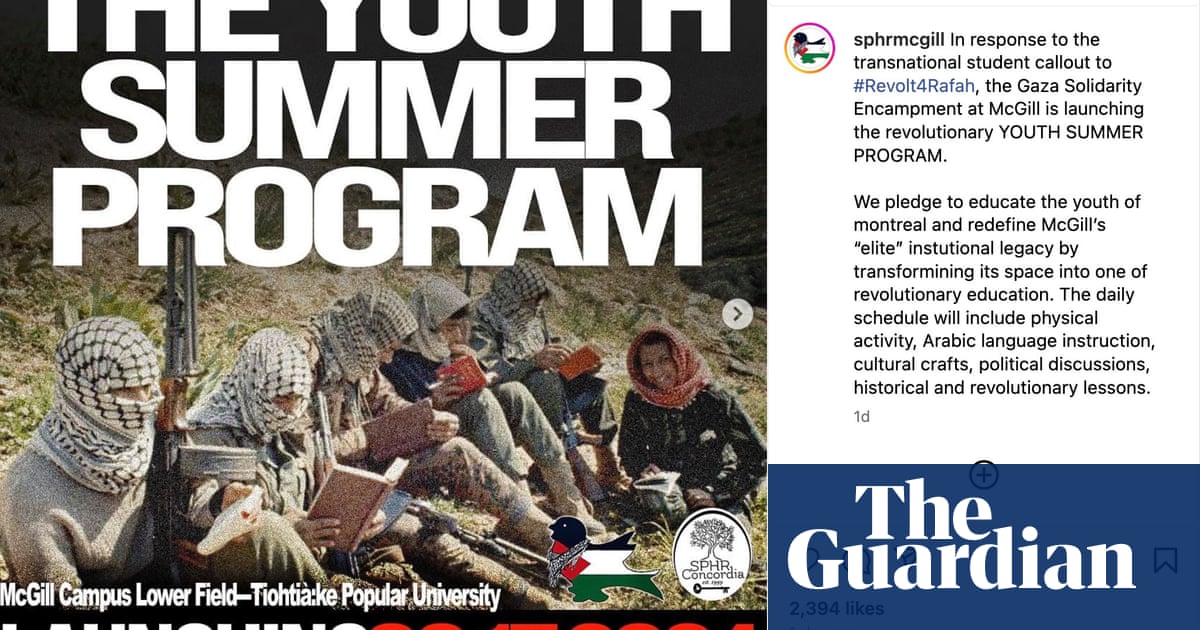A pro-Palestinian student encampment at a prominent Canadian university has announced a “revolutionary youth summer program” with posts featuring photos of masked, armed guerrillas reading communist literature, drawing criticism from a Canadian Zionist organization decrying what it said was metastasizing antisemitism.
The student group Solidarity for Palestinian Human Rights (SPHR) McGill called for students to sign up for “revolutionary” trainings to be held on the university campus this month. Since April SPHR McGill has been occupying part of the Montreal campus to protest against Israel’s ongoing assault on Gaza.
“We pledge to educate the youth of Montreal and redefine McGill’s ‘elite’ institutional legacy by transforming its space into one of revolutionary education,” the group said in a post.
“The daily schedule will include physical activity, Arabic language instruction, cultural crafts, political discussions, historical and revolutionary lessons.”
The announcement was illustrated with photos of gunmen wearing keffiyeh scarves covering their faces reading from Chairman Mao Zedong’s Little Red Book. The photos of the Fatah faction of the Palestine Liberation Organisation were taken in Jordan in 1970, a time when the Chinese Communist party supported the Palestinian movement.
In a statement on Friday, the McGill president and vice-chancellor, Deep Saini, described the use of the image as “extremely alarming” and said the university had contacted law enforcement agencies.
“It should go without saying that imagery evoking violence is not a tool of peaceful expression or assembly. This worrying escalation is emblematic of the rising tensions on campuses across North America, where we have seen many incidents that go well beyond what universities are equipped to manage on their own,” he said.
Saini said the university had contacted “municipal, provincial and federal public safety authorities, flagging this social media post and other recent activities as matters of national security, and requesting all appropriate interventions to ensure the safety of our community”.
Montreal police say they have no plans to end the pro-Palestinian encampment.
SPHR did not respond to requests for comment but one McGill faculty member said that while the advertisement used deliberately provocative imagery, what was being proposed appeared to amount to a teach-in.
“I don’t see anything objectionable in providing history and context to the current movement,” said Barry Eidlin, an associate professor of sociology at McGill.
“Are you going to be outraged about a 50-year-old picture of a PLO guerrilla, or by hundreds of people in a refugee camp being slaughtered because the Israeli government doesn’t know how to negotiate and feels that they can kill any number of Palestinians to justify liberating a few hostages?” he asked.
This week SPHR rejected McGill’s latest offer aimed at securing an end to their protest.
The student group has been calling on the university to cut investments they say are complicit in the genocide of Palestinians and to end relations with Israeli academic institutions.
The students rejected a proposal to offer clemency to protesting students and to review McGill’s investments in weapons manufacturers as “laughable” and “an immaterial response”.
The Canadian Zionist organisation the Centre for Israel and Jewish Affairs (CIJA) called on McGill to stop turning a blind eye to “hate and toxicity”.
“Authorities must act to dismantle the toxic encampment immediately, or the antisemitism, hate, intimidation & harassment will continue to metastasize,” it said in a statement.
“You have masked individuals with assault rifle weapons as the image representing what they hope to do, they’re calling it revolution,” Eta Yudin, CIJA vice-president for Québec, told the Guardian. “One has to ask what they have planned?”

